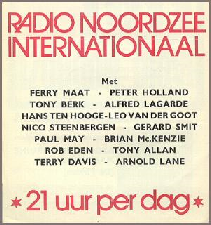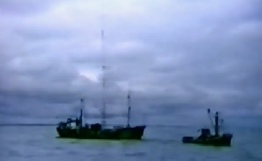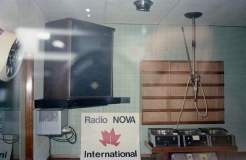© 2014-


RNI - History (7)
In the Spring of 1973 RNI’s Zurich office was closed and the Swiss owners handed over all responsibility for radio programming to the Dutch airtime contractors. This change was attributed partly to the fact that the Swiss Government had introduced legislation against its nationals operating offshore  radio stations and partly due to the desire to demonstrate to the now hostile Dutch Government that RNI was a Dutch operation and could become eligible for airtime on the Hilversum network. With the increasing threat of government action to outlaw the offshore stations RNI launched a campaign, "Hou'm in de lucht" ("Keep it on the Air").
radio stations and partly due to the desire to demonstrate to the now hostile Dutch Government that RNI was a Dutch operation and could become eligible for airtime on the Hilversum network. With the increasing threat of government action to outlaw the offshore stations RNI launched a campaign, "Hou'm in de lucht" ("Keep it on the Air").
The Dutch Parliament considered the question of offshore radio again in June 1973 when the Lower House voted in favour of ratifying the Strasbourg Convention and in favour of a Bill to outlaw offshore radio stations. The day after Parliament's decision RNI issued statements about the station's future. The Dutch Service would remain on the air until the new legislation came into force, but the campaign for a landbased licence (for which an application had already been made) would continue. However, the future of the International (English) Service remained uncertain. The Hou'm in de Lucht campaign had attracted over 30,000 members by mid-
1974
With the progre ss of legislation through the Dutch Parliament during the spring and summer of 1974 to finally outlaw offshore broadcasting there was considerable doubt about the future of RNI. Rumours circulated for many weeks about the imminent closure of the Dutch Service and the repositioning of the Mebo II to a new anchorage from where she could continue broadcasting English language programmes. However, in the end it was decided that both the English and Dutch Services would close when the new law came into effect in Holland, but rumours still persisted about the future location of the Mebo II and its role as a floating radio station.
ss of legislation through the Dutch Parliament during the spring and summer of 1974 to finally outlaw offshore broadcasting there was considerable doubt about the future of RNI. Rumours circulated for many weeks about the imminent closure of the Dutch Service and the repositioning of the Mebo II to a new anchorage from where she could continue broadcasting English language programmes. However, in the end it was decided that both the English and Dutch Services would close when the new law came into effect in Holland, but rumours still persisted about the future location of the Mebo II and its role as a floating radio station.
It was announced on 12th August 1974 that the provisions of the Dutch Marine Offences Ac t were to become effective at midnight on 31st August 1974. RNI's English Service left the air at midnight on 30th August 1974 and during the final hour all English DJs on board the Mebo II took part in a farewell programme. The station's Dutch Service, normally on the air from 6.00am then opened immediately after the English programmes had finished, continuing throughout the night and during the following day.
t were to become effective at midnight on 31st August 1974. RNI's English Service left the air at midnight on 30th August 1974 and during the final hour all English DJs on board the Mebo II took part in a farewell programme. The station's Dutch Service, normally on the air from 6.00am then opened immediately after the English programmes had finished, continuing throughout the night and during the following day.
From 10.00am -
RNI, failed to acquire an entitlement to airtime on the Dutch state system, but, as with Radio Veronica, the organisation refused to die and subsequently managed to re-
The Mebo II rema ined at her anchorage until 9th September 1974 when she sailed into Slikkerveer. Together with the Mebo I she was dry docked and both vessels were scraped, painted and overhauled. On board the Mebo II the transmitter equipment was stripped and overhauled, while a new record library and three new studios were constructed to replace the existing two studio facility. The aerial mast was heightened by 15', a second medium wave aerial was installed and all equipment tested and tuned using a dummy load. It was announced publicly that the ship would sail to an anchorage off Genoa in Italy and broadcast under the call sign Radio Nova International.
ined at her anchorage until 9th September 1974 when she sailed into Slikkerveer. Together with the Mebo I she was dry docked and both vessels were scraped, painted and overhauled. On board the Mebo II the transmitter equipment was stripped and overhauled, while a new record library and three new studios were constructed to replace the existing two studio facility. The aerial mast was heightened by 15', a second medium wave aerial was installed and all equipment tested and tuned using a dummy load. It was announced publicly that the ship would sail to an anchorage off Genoa in Italy and broadcast under the call sign Radio Nova International. 
Another potential use for the refurbished radio ship was as home to Radio Mi Amigo and the owner of that station, Sylvain Tack, visited the Mebo II while she was in Slikkerveer. However, neither of these plans came to fruition and the ship was destined to have a much different future than that planned for her in the autumn of 1974.
The Mebo I and Mebo II left Slikkerverer on 9th October 1974, but were immediately detained by the authorities acting under the provisions of the Dutch Marine Offences Act. Hearings into the right of the owners to move the vessels, one of which carried radio transmitting equipment, contrary to the new Dutch law, were held in 11th November and December 1974. Lawyers for the owners of the vessel argued that because the ship was registered in Panama the laws of that country, which stated that the radio transmitters aboard Mebo II counted as cargo, should apply. The Court was not swayed by this argument and when judgement was given the owners were given permission to take the Mebo II out of port only after the transmitters had been removed from the vessel.


Click on picture to enlarge
The final RNI programme schedule
Click to enlarge
Close of English Service 30th August 1974

Close of Dutch Service 31st August 1974


History
Key Dates
Ship and Location
Technical
Staff
Programmes





Treasure Chest

A video history of Radio North Sea International
Mebo II being towed into harbour, September 1974
Studio for the planned Radio Nova

Back to Netherlands/Belgium Gallery





Back to Britain Gallery


Back to RNI
